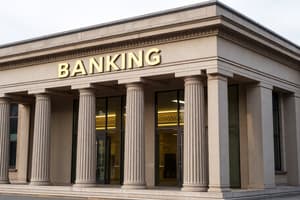Podcast
Questions and Answers
Which type of bank carries out operations related to deposit, withdrawal, and loan activities for the general public?
Which type of bank carries out operations related to deposit, withdrawal, and loan activities for the general public?
- Merchant Bank
- Investment Bank
- Central Bank
- Commercial Bank (correct)
What is the key function of a commercial bank related to receiving funds from the public?
What is the key function of a commercial bank related to receiving funds from the public?
Deposit Function
Commercial banks engage in business operations solely to provide charitable services.
Commercial banks engage in business operations solely to provide charitable services.
False (B)
Commercial banks deal in offsetting of book entries either domestically or ______.
Commercial banks deal in offsetting of book entries either domestically or ______.
Match the bank department with its corresponding function:
Match the bank department with its corresponding function:
A commercial bank can invest in the equities of non-financial enterprises without any conditions.
A commercial bank can invest in the equities of non-financial enterprises without any conditions.
Commercial banks can accept or create demand deposits as part of their general powers incident to corporations.
Commercial banks can accept or create demand deposits as part of their general powers incident to corporations.
A commercial bank can extend credit without any rules or regulations.
A commercial bank can extend credit without any rules or regulations.
Bank employees prepare payroll payment by inserting the correct amounts in envelopes to cover salaries of employees of business concerns.
Bank employees prepare payroll payment by inserting the correct amounts in envelopes to cover salaries of employees of business concerns.
Commercial banks disseminate credit information only within their own offices.
Commercial banks disseminate credit information only within their own offices.
Drafts are not considered instruments for collection in commercial banking.
Drafts are not considered instruments for collection in commercial banking.
The Monetary Board determines the maturities and aggregate amount of investments in marketable bonds and other debt securities.
The Monetary Board determines the maturities and aggregate amount of investments in marketable bonds and other debt securities.
Commercial banks can engage in any type of investment without restrictions.
Commercial banks can engage in any type of investment without restrictions.
A commercial bank has the power to buying and selling foreign exchange and gold or silver bullion.
A commercial bank has the power to buying and selling foreign exchange and gold or silver bullion.
The General Banking Law of 2000 (R.A 8791) under Chapter IV, Articles II and Articles III, Section 53 does not quote the powers of a commercial bank.
The General Banking Law of 2000 (R.A 8791) under Chapter IV, Articles II and Articles III, Section 53 does not quote the powers of a commercial bank.
Flashcards are hidden until you start studying
Study Notes
Commercial Banks
- A commercial bank is a financial institution that performs deposit and withdrawal operations, provides loans, and engages in other activities to make a profit.
- Functions of a commercial bank:
- Deposit function: receives demand deposits and time deposits.
- Loan function: advances sums of money for short periods to individuals and businesses, charging interest at legal rates.
- Exchange function: transfers funds without physical cash movement, using credit instruments.
- Trust function: engages in fiduciary activities, such as estate administration and stock registration.
- Advisory function: provides expert advice to clients on business dealings.
Bank Services
- Rental of safe deposit boxes
- Sale of drafts and cashier's checks
- Sale of traveler's checks
- Collection agent: facilitates transactions between foreign creditors and debtors
- Credit information: provides credit information to clients
- Payrolls: prepares payroll payments for business concerns
General Banking Law of 2000 (R.A 8791)
- A commercial bank has the power to:
- Accept drafts and issue letters of credit
- Discount and negotiate promissory notes, drafts, and bills of exchange
- Accept or create demand deposits
- Receive other types of deposits and deposit substitutes
- Buy and sell foreign exchange and gold or silver bullion
- Acquire marketable bonds and debt securities
- Extend credit, subject to Monetary Board rules
Equity Investments of a Commercial Bank
- A commercial bank may invest in the equities of allied enterprises, subject to conditions:
- Total investment in equities shall not exceed 35% of the bank's net worth
- Equity investment in any one enterprise shall not exceed 25% of the bank's net worth
- Prior approval of the Monetary Board is required for such investments
Universal Banks
- A universal bank is a type of commercial bank that exercises the powers authorized for a commercial bank, an investment house, and has the power to invest in non-allied enterprises.
- Required minimum capital is P4,950 million pesos.
- A universal bank may own up to 100% of the equity in a thrift bank, rural bank, or financial allied enterprise.
Powers of a Universal Bank
- A universal bank may:
- Exercise the powers authorized for a commercial bank
- Invest in the equities of allied and non-allied enterprises, subject to conditions
- Underwrite equity securities and engage in securities dealing, subject to Securities Exchange Commission regulations
Non-Financial Allied Undertakings
- A universal bank may invest in non-financial allied undertakings, such as:
- Warehousing companies
- Storage companies
- Safe deposit box companies
- Companies engaged in home building and home development
- Insurance agencies/brokerages
- Service bureaus organized to perform services for banks and non-bank financial institutions
Financial Allied Undertakings
- A universal bank may invest in financial allied undertakings, such as:
- Leasing companies
- Investment houses
- Banks
- Financing companies
- Credit card companies
- Financial institutions catering to small and medium-scale industries
- Companies engaged in stock brokerage/securities dealership
Departmentalization of a Bank
- A bank may be divided into departments, including:
- Cash department: handles deposit function and allied activities
- Loan and discount department: handles loan and credit functions
- Trust department: handles fiduciary activities
- Foreign department: handles international exchange transactions
- Accounting department: handles financial transactions and accounting procedures
- Auditing department: ensures disbursement accuracy and conducts pre-audits
- Legal department: handles legal matters and protects the bank's interests
- Administrative department: handles general administration and personnel management
Departments of a Commercial Bank
- Cash department: handles deposit functions and allied activities, subdivided into New Accounts, Signature Controls, Safe Deposit Boxes, and Armored Car Services.
- Loan and discount department: deals with loan-related activities, headed by a loan officer, and divided into sections like small loans, credit investigation, rediscounting, and loan releases.
- Trust department: handles fiduciary activities, headed by a trust officer, and deals with legal aspects of banking.
- Foreign department: deals with international exchange, applications for letters of credit, and foreign exchange transactions.
- Accounting department: maintains the bank's financial records, including books, proof sheets, and financial statements.
- Auditing department: ensures disbursements are in order through pre-audits, spot checks, and general control of bank activities.
- Legal department: handles legal matters, ensuring the bank is legally protected in its actions.
Functions of a Commercial Bank
- Deposit function: receives demand and time deposits from the public.
- Loan function: advances short-term loans to individuals and businesses, charging interest at legal rates.
- Exchange function: facilitates transfer of funds without physical cash, using credit instruments and book entries.
- Trust function: engages in fiduciary activities like estate administration, guardianship, and stock/bond registration.
- Advisory function: provides expert advice to clients on business matters.
Bank Services
- Rental of safe deposit boxes: provides secure storage for valuables.
- Sale of drafts and cashier's checks: offers a convenient medium of exchange for customers.
- Sale of traveler's checks: provides a safe medium of exchange for travelers.
- Collection agent: facilitates transaction between creditors and debtors for a fee.
- Credit information: provides credit information to customers and other banks.
- Payrolls: assists businesses in preparing payroll payments.
General Banking Law of 2000
- A commercial bank has the power to carry out various banking activities, including accepting deposits, issuing letters of credit, discounting promissory notes, and buying/selling foreign exchange.
- A commercial bank can invest in equities of allied enterprises, subject to conditions and regulations set by the Monetary Board.
Studying That Suits You
Use AI to generate personalized quizzes and flashcards to suit your learning preferences.




